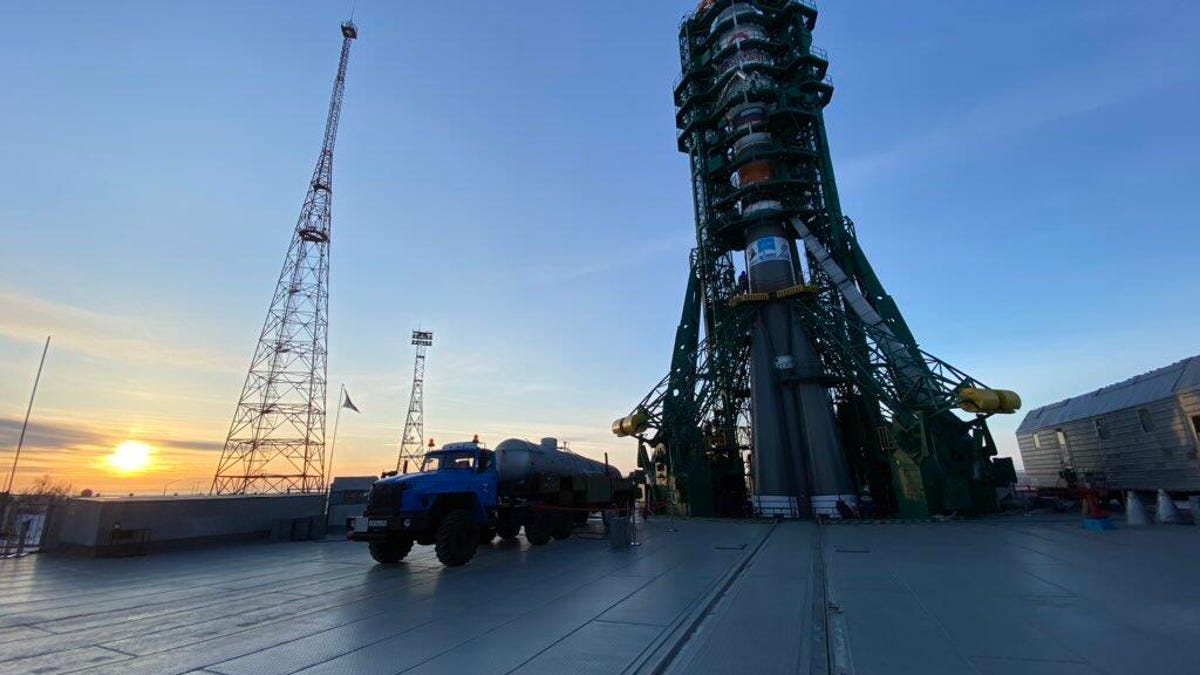OneWeb Stops All Internet Satellite Launches From Russia's Space Complex
Roscosmos leader Dmitry Rogozin had refused to let launches go forward over the UK government's stake in the company.

A Soyuz rocket prepares to launch OneWeb satellites from Kazakhstan in 2020.
The next batch of OneWeb broadband satellites won't be lifting off from the Baikonur Cosmodrome in Kazakhstan this week, as tensions remain high between Russia and Western countries over Russia's invasion of Ukraine. Their launch had been scheduled for Saturday.
The company issued a 12-word statement from London early Thursday: "The Board of OneWeb has voted to suspend all launches from Baikonur."
Statement:
— OneWeb (@OneWeb) March 3, 2022
The Board of OneWeb has voted to suspend all launches from Baikonur. pic.twitter.com/p8l80FGxId
That was in response to an ultimatum from the head of Russia's space agency, who continues to lash out against the West's condemnation of the war in Ukraine by making threats and erecting roadblocks between Earth and orbit.
Roscosmos director Dmitry Rogozin said Wednesday that the agency would not carry out any more OneWeb missions with its Russian Soyuz spacecraft unless the UK sells its share in the company and OneWeb guarantees its constellation will not be used for military purposes.
The UK government teamed up with Indian telecom giant Bharti Global to acquire the financially troubled OneWeb in 2020. Despite some false starts in its history, the company aims to offer competition for Elon Musk's Starlink.
Rogozin's threat came after Musk announced that Starlink has been activated in Ukraine and that SpaceX has begun shipping new receivers into the war-torn nation.
"We have serious doubts about how OneWeb will behave in such a situation when the [UK] government is the controlling shareholder," Rogozin said on Russian TV, according to state news outlet Tass.
The UK government is actually not the largest shareholder. Bharti holds twice as much equity in the company, and Eutelsat and Softbank are also significant shareholders.
UK Business and Energy Secretary Kwasi Kwarteng made clear on Twitter Wednesday that the country will be holding onto its stake.
"There's no negotiation on OneWeb: the UK Government is not selling its share," Kwarteng wrote. "We are in touch with other shareholders to discuss next steps..."
There's no negotiation on OneWeb: the UK Government is not selling its share.
— Kwasi Kwarteng (@KwasiKwarteng) March 2, 2022
We are in touch with other shareholders to discuss next steps...
Bharti didn't immediately respond to a request for comment.
Russia's invasion of Ukraine, which began last Thursday, and the reaction to it has been playing havoc with space operations around the world. The ExoMars mission, developed in partnership between the European Space Agency and Roscosmos, is now no longer expected to launch this year due to the fallout over European sanctions against Russia.
Russia has also halted all Soyuz launches from Europe's spaceport in French Guiana and stopped shipping rocket engines to the US.
Last week, Rogozin seemed to threaten to drop the International Space Station on the US or Europe in response to initial talk of US sanctions. True to form, Musk stepped up on Twitter to volunteer SpaceX spacecraft to take over the job of steering the ISS that's now done with the help of Russian engines.
Meanwhile, three Russian cosmonauts are set to launch to the ISS this month shortly before two different cosmonauts and one NASA astronaut return to Earth in a Soyuz capsule.

